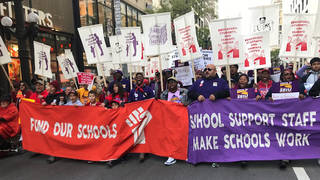
Guests
- Randi Weingartenpresident of the American Federation of Teachers.
In West Virginia, public schools remain closed today, after the state’s teachers’ unions remained on strike over the high cost of health insurance. On Tuesday, West Virginia Gov. Jim Justice agreed to boost teacher salaries by 5 percent in the first year of a new contract, but the teachers say the deal isn’t enough to offset skyrocketing premiums in the Public Employees Insurance Agency. Some 20,000 teachers and 13,000 school staffers say they’ll remain on strike until they win a better agreement on healthcare.
Transcript
AMY GOODMAN: But I want to ask Randi Weingarten, head of the American Federation of Teachers, one unrelated question, but because it’s happening right now, not far from you, in West Virginia—
RANDI WEINGARTEN: Right.
AMY GOODMAN: —public schools remaining closed today after the state teachers’ union remained on strike over the high cost of health insurance. It was believed that the strike was ending yesterday, when Virginia Governor Jim Justice agreed to boost teacher salaries by 5 percent in the first year of a new contract, but the teachers said the deal wasn’t enough to offset skyrocketing premiums in the Public Employees Insurance Agency. Explain what the demands are.
RANDI WEINGARTEN: Sure, Amy. And also, let me just say, what that teacher did in that class, the kind of voice that teachers need, that is what the Florida Legislature is trying to strip from them, that kind of autonomy.
In West Virginia, there is—remember, there’s no collective bargaining in West Virginia. So, it is whatever—we’d lobby the Legislature and the governor, and we got to a deal, so to speak, of increasing salaries by 5 percent this year—you know, it is not enough, because of what West Virginia teachers make, and they need to make more—and to actually freeze the premiums for about 18 months. The problem is, the bills have not actually gone through a very hostile House and Senate, and no one trusts the governor. And so, there—until some of these bills go through and there’s a task force that actually takes on these huge premium hikes over the long term, you have a lot of confusion.
So, there has been a bunch—what the union said to the governor and to the Legislature was, “Give us two or three days to actually talk to our members about what deal we think we have struck, and get these bills through the Legislature.” And they didn’t want to do that. And as a result, the schools were closed on Friday. We are working very hard to get schools open on Monday. The real issue is, people just don’t trust that Legislature and that governor, because their salaries have gone down. And all these fights that we’ve had to try to raise these issues before the strike were unheeded. They were not listened to until the strike.
AMY GOODMAN: Randi Weingarten of the American Federation of Teachers, thanks so much for being with us.
RANDI WEINGARTEN: Thank you.
AMY GOODMAN: When we come back, we’re going to look at what’s happening in the Arctic, the Arctic where temperatures have soared to record-shattering heights. What does this mean for the world? Stay with us.
[break]
AMY GOODMAN: “Here Is Your Land” by the Guatemalan rock band Alux Nahual. Its former drummer, Lenín Fernández, died on Monday.













Media Options